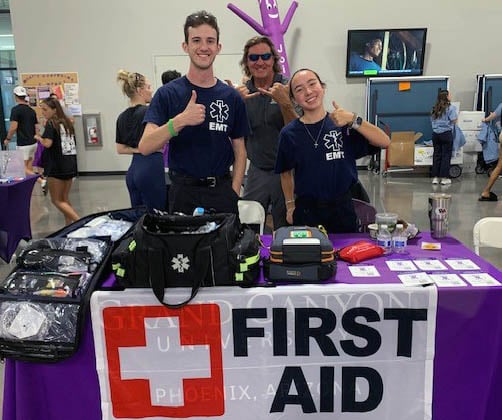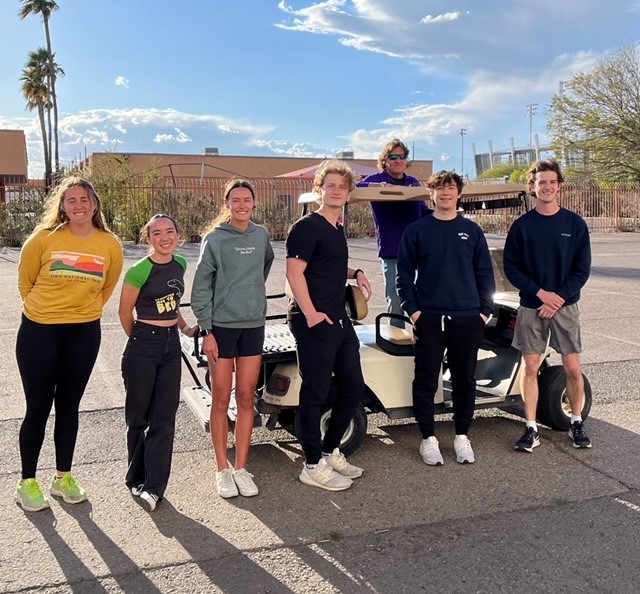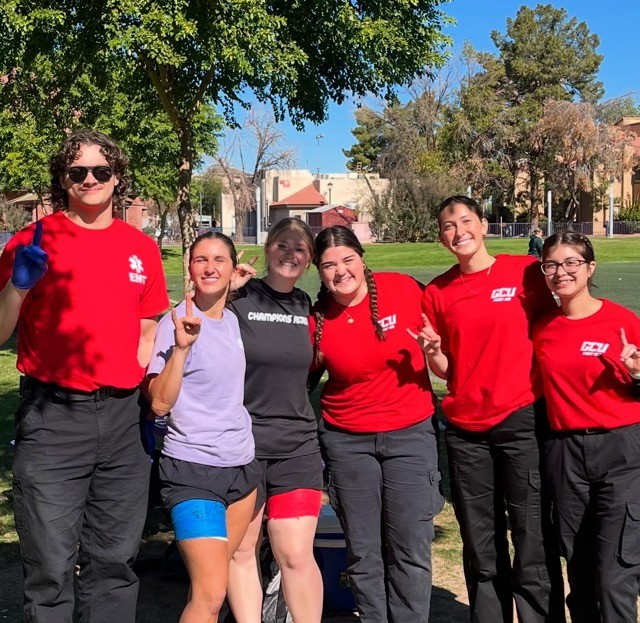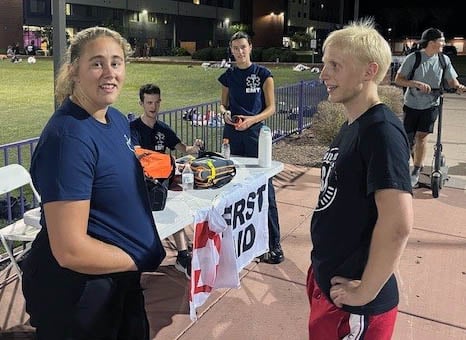
Commencement is joyous and emotional and jubilant and chaotic. It’s also go-time for the student-staffed Grand Canyon University Emergency Medical Services team.
“One time while working commencement, I had a patient pass out in the shower, cut their eyebrow open, and they had to go to the hospital,” said Sydney Cox, nursing student and EMS team member.
It’s part of the experience for the team of dedicated students who work alongside the university’s Public Safety department to provide essential medical aid at campus events and are ready to respond when on-campus emergencies happen.
The team is frequently called to assist at major GCU events, including commencement, move-in and intramural and club sports. From responding to fainting incidents to handling more serious injuries, team members provide immediate aid to reduce the strain on the Phoenix Fire Department and enhance campus safety.

The idea for a student EMS program at GCU started with campus Emergency Preparedness Coordinator and EMS senior staffer Scott Levandowski, anatomy and physiology instructor Michael Barton, the Canyon Health and Wellness Clinic, and the university’s Emergency Preparedness administration.
After reviewing the statutes for EMT programs and volunteer services, they realized they could launch the initiative right away. Within a week, the EMS program had a presence during winter commencement 2023, providing bandages and water bottles – and students have been out at commencement ceremonies this year, too.
The program operates with minimal funding through Emergency Preparedness and receives medical supplies from the Health and Wellness Clinic, said Director of Emergency Preparedness Marcus Castle. The group is working toward a more sustainable model for long-term growth and increased student engagement.
Castle is hoping, as the group wraps up its inaugural year, to recruit 25 more students to staff an EMS golf cart seven days a week to respond to campus medical emergencies.
The program already has grown remarkably over the past year.
EMS captains now manage staffing and training, an emergency medical paramedic is part of the team, students have logged more than 1,189 volunteer hours as of Tuesday while covering more than 25 events and responding to 70 medical emergencies.
Student EMS team members are dispatched through Public Safety and respond to calls from the department’s lounge in Papago Apartments.
“The station is a great place for EMS students to learn from other pre-med students and EMT/EMS students while waiting for the next call,” Levandowsi said.
An emergency cart sits outside the building, ready for use when students respond to calls, and a full kitchen, study room, gear room and radios are inside the station.
The team works closely with the Phoenix Fire Department, which is called in to help if GCU EMS determines a patient needs further care and transportation and to ensure serious cases receive proper attention.
One advantage of an on-campus student EMS team is that it can respond to emergencies faster than external responders, which is crucial, and they can respond to mental health crises that the fire department would not typically respond to.

A key challenge is ensuring fellow students trust their capabilities.
“Because we’re also students, patients sometimes think we’ll talk about the incident or that we’re not qualified,” nursing major and GCU EMS team member Ava Polyak said. She emphasized that all EMTs in the program are nationally and state certified, and HIPAA regulations legally prohibit them from sharing patient information.
One of the biggest misconceptions about the EMS program is that students must already be EMT-certified to participate.
Anyone can join, gain experience and train while working toward their certification. The program offers flexible scheduling, making it an ideal opportunity for majors in the medical fields who want to balance work experience with their studies.
EMS Capt. Aaron Millett said, “EMT-certified students receive additional training on CPR, IVs, IV fluids and medication administration. For those who are not yet EMTs, they can still join the program, work shifts with certified EMTs, and begin learning fundamental skills while earning volunteer hours.”
The program operates with a structured ranking system identified by different shirt colors:
- Red shirts – Basic life support-trained students or EMTs
- Blue shirts – Leads with more experience who have completed advanced training courses
- White shirts – Captains who oversee staffing, training and operations
To advance to the blue-shirt level, students must be in the program for at least one semester, hold an EMT certification, and complete three specialized training courses, including trauma assessment and public safety communication.
EMS shifts run from 9 a.m. to 10 p.m. The program allows medical students to choose their hours and pick up or trade shifts as needed. The hours go toward clinical, volunteer and patient hours.
The team meets twice a week to go over past cases, discussing ways they could improve as a team and to practice skills, such as splinting ankles or cardiopulmonary resuscitation, and to prepare for upcoming events.
"It’s like working an EMT job because you are getting the same patient contact," said student EMT Sophia Kissi, who said the program has given her valuable patient care experience that has helped her prepare for a future job.

For Polyak, being a part of GCU EMS has been life-changing.
She first heard about the program through a screenshot sent by her admissions counselor. She initially was an education major but switched to nursing after her involvement in GCU EMS.
“As a nursing student, I’ll be able to take what I learned in the field and apply it in a hospital setting,” she said.
Added Cox, “It’s a really good way to get clinical hours, improve skills, and get ready for the next step of your education."
Student writer Leandra Lepp can be reached at [email protected].
***
To find out more about the student EMS team or to join: Contact the group at [email protected] or follow it on Instagram.
Student writer Leandra Lepp can be reached at [email protected].
***
Related content:
GCU News: Health student leaders challenge campus to do 1% better every day
GCU News: Three GCU nursing graduates' bond continues on one hospital floor



































































